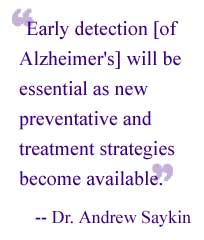
|
For Release: July 22, 2004
Contact: DMS Communications(603) 650-1492
Print Version
Brain Imaging Techniques Sharpen Focus on Alzheimer's
HANOVER, NH -- Imaging techniques useful in diagnosing Alzheimer's disease earlier may also help distinguish it from other types of dementia, according to Dartmouth Medical School research reported July 20 at the 9th International Conference on Alzheimer's Disease and Related Disorders (ICAD), by the Alzheimer's Association in Philadelphia.

A combination of anatomic and functional magnetic resonance imaging (MRI), which can detect brain abnormalities in people with Alzheimer's disease, may also be able to identify brain changes in people who complain of cognitive deficits but do not meet the criteria for a diagnosis of mild cognitive impairment (MCI) or Alzheimer's, said Dr. Andrew J. Saykin, professor of psychiatry and radiology. The findings may allow very early diagnosis of Alzheimer's and improved assessment of treatment effects.

Saykin leads a team following the progress of 90 older adults as they age. At the outset of the study, 30 of the participants reported no significant declines in memory or other mental functions, while another 30 had cognitive deficits that warranted a diagnosis of MCI. The remaining 30 participants - termed the "cognitive complaint group" - had perceived deficits in memory and other mental functions that did not reach the threshold for MCI diagnosis and could not be explained by depression or other health problems.
The researchers are employing repeat MRI scans to track changes in gray matter and brain activity during memory task performance and comparing the three groups over time. However, even in the baseline study, a surprising parallel was noted between the cognitive complaint and MCI groups.
"The pattern of reduction of gray matter and brain activity in the older adults who complained of cognitive deficits was almost identical to that seen in patients with MCI, suggesting that many of these people may be in the earliest stages of Alzheimer's," said Saykin. "Early detection will be essential as new preventative and treatment strategies become available."
-DMS-